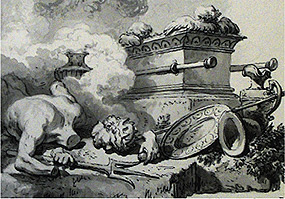 Increasingly, I believe too many Christians do not have a Christian response to most aspects of life. Instead of a true New Testament Kingdom of God mentality, we have firmly ensconced ourselves in an Old Testament judge mentality, despite the Old Covenant’s obsolescence and replacement and the demise of the national Israel of the Old Testament.
Increasingly, I believe too many Christians do not have a Christian response to most aspects of life. Instead of a true New Testament Kingdom of God mentality, we have firmly ensconced ourselves in an Old Testament judge mentality, despite the Old Covenant’s obsolescence and replacement and the demise of the national Israel of the Old Testament.
Compounding this error, American Christians have a desperate need to be seen as right on everything, regardless of who or what this tramples. To our amazement, we are now eating the fruit of that error and yet remain incredulous and oblivious to how this reversal of fortune came to be.
To sum it up, we’ve been doing it wrong and just can’t admit that we’re the ones who screwed up.
Of course, this does not excuse the world, as the world has screwed up just as badly or worse. But we Christians simply can no longer pretend that we are innocent bystanders to our own undoing.
I write all this because I continue to see rotten and ill-advised behavior by Christians in the public square. We can’t seem to learn our lessons.
This post is about getting ourselves back on course. Take it for what it is, a 50-something Christian attempting to inject some wisdom into the conversation.
How Christians Must Think and Act about the News & Current Events
The most important thing to understand about all news and about all conversations that spring from current events: Most likely, you and I were not there. For this reason, anything we hear in response is hearsay.
The Bible says this:
“Again, you have heard that it was said to the people long ago, ‘Do not break your oath, but fulfill to the Lord the vows you have made.’ But I tell you, do not swear an oath at all: either by heaven, for it is God’s throne; or by the earth, for it is his footstool; or by Jerusalem, for it is the city of the Great King. And do not swear by your head, for you cannot make even one hair white or black. All you need to say is simply ‘Yes’ or ‘No’; anything beyond this comes from the evil one.”
—Matthew 5:33-37 NIV
Jesus is talking about oaths and vows here, but His point is that we not go in our speech where we cannot promise or understand. When we go beyond our understanding, we invite Satan into our words.
I believe this is critical for how we speak in the days ahead.
When we comment on news stories and current events, we rely on hearsay, information we cannot corroborate. Most of are old enough and wise enough to know that unbiased reporting is a myth and probably always has been. Human beings always bring their own perspectives and biases into all communications. Period.
If you and I were not there to witness and personally experience an event, commenting on motivations of individuals/groups/governments and speculations beyond what was personally seen with eyes and heard with ears are out of bounds for us. We simply cannot know.
The proper Christian response in that case is not to speculate, but to say instead, “What a tragic event!” or “How sad for those people.”
That is letting your yes be yes and your no no.
The Bible makes the truth of this even more clear:
The heart is deceitful above all things, and desperately wicked: who can know it?
—Jeremiah 17:9 KJV
You cannot know another’s motivations. Heck, you cannot even know your own motivations, so how can you speculate on what people involved in crimes or tragic events were thinking or why they acted the way they did? Do you know that person personally? Do you know his or her story? Were you there with them when they did what they did?
No, you do not know and you likely were not there. So don’t speak as if you do know or were there.
In short, don’t add fuel to any fire about which you know nothing. And the fact is, you and I know nothing about most everything.
The only Christian response is to say as little as possible and to leave the speculation to speculators, of which you are not to be.
Instead be as still as possible. Yes yes, and no no.
How Christians Must Think and Act about Politics (I)
The only allegiance the Christian is to have is to the King, Jesus, and to his Kingdom. Jesus Himself said this. He takes precedence even over our families. He is #1, and everyone and everything else is a far distant #2. This is God’s wisdom for our own spiritual health.
When it comes to the Kingdom of God, we are to pursue it first and foremost. In all we do, we do it for the King and the Kingdom.
To this end, when we engage in politics, we are to engage it with a Kingdom perspective and as citizens of the Kingdom of God before considering any earthly Kingdoms:
Seek the Kingdom of God above all else, and live righteously, and he will give you everything you need.
—Matthew 6:33 NLT
Therefore, when we consider candidates for political office, we should keep this in mind:
1. The candidates we endorse should pursue and promote the Kingdom of God as much as humanly possible within a system of government, as directed and empowered by God.
2. Candidates for political office who receive our vote must reflect the evidences of the Kingdom of God and its fruit: Love, Joy, Peace, Patience, Kindness, Goodness, Faithfulness, Gentleness, and Self-Control.
3. We should in no way endorse, promote, or vote for a candidate who does not reflect the two conditions above.
No excuses, Christian. Do not vote for or endorse candidates who cannot or will not reflect the purposes of the Kingdom of God. Vote for someone else. Write in a vote. But do not cast your vote for people who oppose the Kingdom of God and its evidences and fruit.
How Christians Must Think and Act about Politics (II)
If we want to talk about governments and the Bible and attempt to pry verses out of the Bible to endorse the American system of government, we will fail. I’ve looked, and I see no evidence for a democratic system of government in the Scriptures. Likewise, if we want to find a federalist system of government, we might find something similar, but that would be Rome—not the most positive example in most of Scripture. Read Revelation if you don’t believe me.
We Christians in America have it difficult, because in America, the system of government is by the people and for the people. Finding direct Bible verses that speak to how such a form of government would operate and how Christians within it should operate it is like finding a needle in a haystack—except there is no haystack.Monarchies rule in Scripture. Even the Kingdom of God is a monarchy.
This poses a problem for Christians who attempt to pry verses out of the Bible to endorse how our American government is to act.
Christians are given direction on how they are supposed to function as members of the Church, but not so much on how they are to govern on immigration issues, for instance. We are to be kind to all aliens, but would closing down immigration into our country for a set number of years become an unkindness? We don’t have a Bible verse for that.
The problem is, we err sometimes when we attempt to force a verse to say something about government immigration policy when it’s not meant to be used that way.
Part of the problem for the American Christian is that we will NOT find verses that tell us how we should handle gun control, or immigration, or welfare, or any of a number of other topics intended at a governmental level. We are sometimes told what we should do in our churches, but the government is not the Church, nor vice versa, and too many Christians try to meld the two, resulting in an unholy abomination that works neither as a Church nor as a responsible government.
Again, we must go back to the Kingdom of God.
What does the American government look like when American Christians act out their responsibilities as citizens within a representative government of the people and for the people WHILE also promoting their primary responsibility, the advancement of the Kingdom of God?
I find this question is not asked by most Christians, nor even most Christian politicians. Instead, we make futile attempts to make the Bible say things about governance in a federal republic that aren’t there in the Book.
What this means is that Christians in America need to rely on the source of wisdom we perpetually think we can do without: the Holy Spirit. The Holy Spirit is the mouthpiece and “town cryer” of the Kingdom of God. The Holy Spirit is the distinguishing mark of the Church.
Keep in place the underlying Scriptures that speak to Christian character and practice on a 1:1 level , but govern in such a way that we Christians listen to and operate from the leadership of the Holy Spirit, which we then carry over into our government.
Sadly, most Christians today have no idea how to make that happen, because too many of us are plugged into our gadgets and distractions and not plugged into hearing the voice of God through the Spirit.
Want a godly government? Christian, put the Kingdom first and listen to the voice of the King. We may not have a verse to cover a particular issue, but we will be covered by the voice of the Spirit, who can speak to any situation we face.

 And what is that idol? Well, I mentioned it already: Power.
And what is that idol? Well, I mentioned it already: Power.